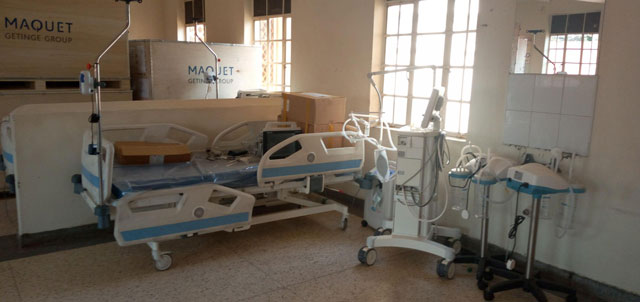
Kampala, Uganda | THE INDEPENDENT | Uganda might go through the second wave of COVID-19 without functional Intensive Care Units. ICUs are used to handle severe COVID-19 cases with breathing difficulties due to organ failure, one of the side effects of the disease.
To better handle COVID-19 cases, the health ministry announced plans last year to fit all the 14 regional referral hospitals with 10 ICU beds. However, more than a year since the announcement was made and the beds procured, many regional health facilities do not have functional ICU units.
Some of the scientists interviewed by URN say the second wave of COVID-19 also known as the resurgence of the disease will likely see an increase in the number of patients. They predict that people as young as 30 and below this time round will likely suffer from severe forms of the disease.
URN visited a number of COVID-19 treatment wards in the country to gauge their level of preparedness for the next wave of the disease. Hospital administrators told URN that the units are nonfunctional due to lack of trained nurses, anesthesiologists and space to place the beds.
Arua Regional Referral hospital received eight beds but they are still lying in the orthopedic ward due to lack of space. Yunus Oboth, a senior administrator at Arua hospital says that the beds cannot be used since the team supposed to install them never returned. He also says that none of their staff is trained to handle COVID-19 cases.
Many of the hospitals didn’t have ICUs prior to the COVID-19 pandemic outbreak last year. As such, many of them lack structures where the units could be set up. Dr. Nathan Onyach, the Executive Director Masaka Regional Referral hospital says the construction of that building that will host the ICU is ongoing.
The situation isn’t any different at Gulu and Fort Portal Regional Referral Hospitals. They neither have the beds nor critical care staff. Entebbe Regional Referral hospital, which handled the first COVID-19 case in the country also has similar problems. Muhammad Mubiru, the Principal administrator Entebbe Regional Referral hospital says despite closing the hospital to manage the disease, they only have seven fully installed ICU beds.
“We did not install accompanying equipment on some of the beds because of lack of space in the ward where we are managing cases on the ground floor of the private wing,” he said. Professor Freddie Ssengooba, an expert on health economics and health systems management says that the lack of functioning ICUs even after beds were procured is evidence of poor public planning and spending.
“These hospitals were never built to handle such services. They were constructed years back but almost no effort was being made to update them. If COVID-19 did not strike, they probably would not even have the new beds. They have been sitting there with no available space or even staff to man an ICU. Government has been spending elsewhere, and while its good more money was spent to procure the beds, more planning was needed to make sure that spent funds were put to good use,” he said.
During the first wave, hospitals across the country referred critical patients to Mulago National Referral Hospital, which has the biggest ICU facility in the country with 44 beds. This scenario doctors at Mulago say contributed to the high number of deaths reported at the hospital.
Dr. Rose Byanyiima, the Deputy Executive Director of Mulago National Referral Hospital and head of the COVID-19 treatment facility says congestion led to avoidable deaths.
According to the hospital, at least half of all patients admitted to the ICU succumbed to COVID-19.
“When we had fewer cases, we had no deaths. Health workers were able to concentrate on a few cases. But when the numbers in health facilities and ICUs increased, it was inevitable for the deaths to start occurring,” Dr. Byanyima said.
The Health Ministry is in the final stages of preparing a COVID-19 resurgence plan. As part of the plan, health workers will undergo training and previously closed treatment units will be re-opened. The Health Ministry Permanent Secretary Dr. Diana Atwine says that in addition to this, they will train critical care staff.
“We procured 150 beds but due to shortages of space at some facilities, we could not install all ten beds. But we are working towards providing space at those facilities that have raised the complaint and we are also working to training the manpower needed,” Dr. Atwine said.
According to Dr. Atwine, the health ministry wants to have as many as 150 anesthesiologists and over 300 critical care nurses. She says they plan to post at least five critical care nurses at every regional referral hospital.
Whether the ministry’s interventions to get the ICUs functional will succeed is only a matter of time. For now, the beds that were procured to save lives are gathering dust.
******
URN
 The Independent Uganda: You get the Truth we Pay the Price
The Independent Uganda: You get the Truth we Pay the Price


